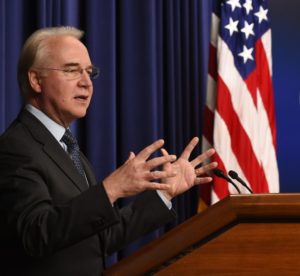Gutting Obamacare Isn’t Enough; Price Quietly Moves to Privatize Medical Care for the Elderly

While Trump and the Senate whip the nation into another frenzy over another effort to repeal and replace the Affordable Care Act, high-flying Tom Price and his Health and Human Services Dept. (HHS) are quietly floating plans to significantly alter Medicare and Medicaid.
The new proposal? A move toward privatization, of course. Allow doctors to charge more money for their services and make the elderly and poor pay the price.
The agency’s policy center, the Centers for Medicare and Medicaid Innovation (CMMI), put out a Request for Information last week as it prepares to “lead the Center in a new direction” and unveil potentially drastic changes to the federal programs that provide healthcare insurance for more than 130 million Americans, including children. CMMI, which has broad authority over some $1 billion annually, was created by Congress in 2010 to examine and test new models to pay for and deliver healthcare.
Medicare’s main trust fund is projected to run out of money in a decade and Medicaid is the second-largest line item in most state budgets, according to Seema Verma, administrator of the Centers for Medicare and Medicaid Services (CMS), who wrote an op-ed piece for The Wall Street Journal selling the new ploy to overhaul the federal insurance plans a day before the agency filed the document.
“Strengthening Medicare and Medicaid will require healthcare providers to compete for patients in a free and dynamic market, creating incentives to increase quality and reduce costs,” Verma wrote. “We must shift away from a fee-for-service system that reimburses only on volume and move toward a system that holds providers accountable for outcomes that allows them to innovate.”
That sounds great, until you look at the concepts in the document and realize without the current regulations in place, physicians won’t be held accountable and patients could get fleeced.
One of the main new payment models proposed is the idea of private contracts between Medicare patients and their healthcare providers–an idea HHS Secretary Tom Price introduced via legislation when he was a conservative congressman from the state of Georgia, which likely landed him his current gig.
While legal, it’s not popular among most physicians who accept Medicare. Of those doctors who work with the federal program, about 96% avoid private contracts because if they took them, they would be barred from accepting some Medicare payments for two years. Today, it’s mostly dentists and mental-healthcare providers who use private contracting with patients. But maybe Price could use the sway of the $1 billion-CMMI to get around those rules.
For patients, entering into a private contract with a physician means that the doctor can charge whatever they want for a service because they are not bound by Medicare laws to limit their fees and the patient is responsible for that full fee per the contract. For example, a colonoscopy with biopsy is about $500 on a Medicare fee schedule, with Medicare paying $400 and the patient paying $100 in the standard 80/20 rule of the fee schedule. The average out-of-network cost among private insurers is about $1,200 but there is no cap on what a physician can charge under private contracts. And today, half of all people on Medicare live on annual incomes of about $24,000 or less.
Action Box/What You Can Do About It

Contact HHS Secretary Tom Price and tell him removing regulations that protect our most vulnerable patients is unacceptable. Call him at 202-690-7000, email him, or reach out on Twitter or Facebook.
Contact Seema Verma at CMS and provide some feedback to this proposal by Nov. 20. Call her at 202-619-0630 or email her.
Contact Donald Trump and remind him (and his base) of his campaign promises and how he said he wouldn’t touch Medicare or Medicaid. Reach out via his favorite platform, Twitter.
Contact your representatives and senators and ask them to support the 130 million Americans on Medicare and Medicaid.
“Beginning down this treacherous path is a clear sign that Secretary Price is betraying Donald Trump’s campaign promise not to touch Medicare or Medicaid and instead pursue his ideological goals at the expense of vulnerable Americans,” said Sen. Ron Wyden (D-Ore.), the ranking member on the Senate Finance Committee, which has jurisdiction over Medicare.
It could also open the door for more physicians to engage in balance billing: charging patients the difference in payment they receive from Medicare.
“There have been all of these stories about emergency room surprise billing, out-of-network balance billing – none of that’s a problem in Medicare,” Tim Gronniger, a nonresident fellow at the Brookings Institution and a former CMS official under President Barack Obama, said in the STAT article. “There’re opportunities for really significant new costs for Medicare patients.”
In an odd twist, the document suggests the agency may pit the traditional Medicare program against the private Medicare Advantage plans. It states, “CMS is potentially interested in a demonstration that Medicare Advantage that incentivizes MA plans to compete for beneficiaries, including those beneficiaries currently in Medicare fee-for-service, based on quality and cost in a transparent manner.”
Republicans see that as a way to reduce federal spending on Medicare and encourage robust competition among private insurers. Democrats and consumer advocacy groups, on the other hand, point out the key differences between traditional Medicare and private Medicare plans, such as paying higher prices for going out of network in the latter, to name just one.
The agency also wants to look at a new prescription model for both Medicare Parts B and D, and State Medicaid programs, targeting value-based purchasing agreements that will likely force Medicare and Medicaid beneficiaries to comparison shop, because the government is interested in plans that “better align incentives and engage beneficiaries as consumers of their care.”
HHS also said in its proposal that it intends to work with states on a variety of Medicaid and Children’s Health Insurance Program (CHIP) initiatives, including giving states more flexibility for multi-payer reforms. Models would be based on the needs and goals of each state.
This is just the early stages of the process–feedback is due Nov. 20–but what should really rattle Americans is that these changes don’t require new legislation.




